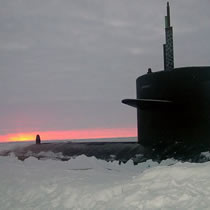
 |
|
|
June 27, 2008
Ice-free North Pole likely"There's supposed to be ice at the North Pole. The fact that we may not have any by the end of this summer could be quite a symbolic change."According to scientists from the National Snow and Ice Data Center in Boulder, Colorado, the North Pole may be briefly ice-free by September as global warming melts away Arctic sea ice. 
"We kind of have an informal betting pool going around in our center and that betting pool is 'does the North Pole melt out this summer?' and it may well," said the center's senior research scientist Mark Serreze. "What we've seen through the past few decades is the Arctic sea ice cover is becoming thinner and thinner as the system warms up," Serreze said. Specific weather patterns will determine whether the North Pole's ice cover melts completely this summer, he said. "Last year, we had sort of a perfect weather pattern to get rid of ice to open up that Northwest Passage," Serreze said. "This year, a different pattern can set up so maybe we'll preserve some ice there. We're in a wait-and-see mode right now. We'll see what happens." "From the viewpoint of the science, the North Pole is just another point in the globe, but it does have this symbolic meaning," Serreze said. "There's supposed to be ice at the North Pole. The fact that we may not have any by the end of this summer could be quite a symbolic change." "Five years ago, to think that we'd even be talking about the possibility of the North Pole melting out in the summer, I would have never thought it," he said. "If you talked to me or other scientists just a few years ago, we were saying that we might lose all or most of the summer sea ice cover by anywhere from 2050 to 2100," Serreze said. "Then, recently, we kind of revised those estimates, maybe as early as 2030. Now, there's people out there saying it might be even before that. So, things are happening pretty quick up there." "It's not cyclical at this point. I think we understand the physics behind this pretty well," he said. "We've known for at least 30 years, from our earliest climate models, that it's the Arctic where we'd see the first signs of global warming. "It's a situation where we hate to say we told you so, but we told you so," he said. "If we had a few cold years in a row, we could put sort of a temporary damper on it, but I think at this point going to an ice-free Arctic Ocean is inevitable," he said. "I don't think we can stop that now." "It would recover fairly quickly, but it's just not going to happen for a while," he said. "I think we're committed at this point." "There's also, or course, oil at the bottom of the Arctic Ocean," he said. "Now, the irony of that is kind of clear but the fact that we are opening up the Arctic Ocean does make it more accessible." © AlaskaReport.com All Rights Reserved. |
|